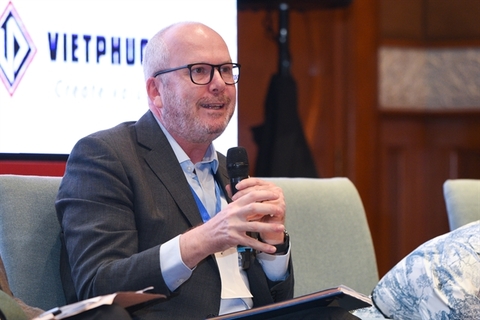Facing the impacts of climate change, biodiversity reduction, and epidemics, the transition to a transparent, responsible and sustainable food system would help Viet Nam become a centre of food supply not only for nearly 100 million people in the country but also contribute to ensuring world food security.
In an effort to protect the environment and improve farmers’ livelihoods, thereby improving the life quality of the community and consumers, Nestle is supporting farmers to transition to a regenerative agriculture model.
Chris Hogg, Head of Sustainability and Communications, Zone Asia, Oceania and Africa, Nestle, who is attending the 4th Global Conference of the One Planet Network's Sustainable Food Systems being held in Ha Noi from April 24-27 talks about the company’s support for Viet Nam’s sustainable food system.
Nestle is supporting the food system transformation in the countries and regions in which it operates. Why did Nestle make the decision and what is the company doing to support and accelerate this transformation?
We are the world's biggest food company. So it means that we need good quality and sustainable ingredients in order to make sure that at a time when things are going down, we're doing this in the most sensible way that we can. Climate change, of course, is a huge issue for the whole world. And Nestle has promised to be net zero carbon by 2050. One way we do this is by investing in regenerative agriculture which means using practices which are good for the planet, good for the community, and good for the farmers as well, making sure that they've got the livelihoods. So we need to invest in agriculture because when you're a food company, agriculture is incredibly important. So you need a lot of materials in order to make your products.

It's really important that we play our role as the world's biggest food company, in helping agriculture to change and transform itself, said Chris Hogg. — Photo courtesy of the firm
What is Nestle doing to help transition to a sustainable food system in Viet Nam?
One of the most important things is helping farmers to move from being farmers to what we call agripreneurs. That means making sure that farms are as productive as possible, so that they have good livelihoods and good income. At the same time making sure that the farming that they do and the practices that they follow are good.
So we work, for example, in the Central Highlands with coffee farmers in what we call the Nescafe Plan 2030. And we're investing there in practices that will improve carbon and regenerative agriculture. But most of all, we'll make sure that those farmers have great livelihoods. So that they will continue to stay on the land to produce the great quality coffee that they do best.
Could you share the challenges and opportunities when Nestle applies the regenerative agriculture model - one of the solutions to help transform the food system in Viet Nam?
One of the biggest challenges with asking farmers to maybe change their ideas, change the practices that they've heard from their grandfathers and their fathers, and to do something different to maybe use less fertiliser, maybe to use fewer pesticides, to take on different ways of making the soil health better. It is that you're asking them to take the leap of faith, you're asking them to trust you that really what you are telling them or encouraging them to do is going to be a benefit.
So one of the things that we do to try to do as much as possible is to create pilot farms so that we can show them how there is a benefit. And the other thing that we do is we train the trainers. So we get groups of 50 to 100 farmers and they elect the farmer leaders and then we train that leader so that they are helping us make sure that the messages make sense.
The other thing when I've been to the Central Highlands we have an army of economists who are the heroes really, we're helping to work with this. Often these agronomists are coming from the farming families themselves. So they really know that we work with farm workers to make all things make sense.
What are the potential and advantages of Viet Nam's agricultural sector in transitioning to a sustainable food system and becoming a regional food innovation hub?
What this is really all about, is making sure farming is a good profession to join. You know that if you inherit your family farm, it makes sense for you and your family to stay on the land. So the more that we can help with improving the productivity of farms in a regenerative way, meaning a way that is good for the soil, good for the planet, then you're going to have a double benefit. You're going to have a benefit to that farmer, because you're going to have a more productive enterprise a more productive farm. But most importantly, these are efforts that are going to be good for the planet. We're facing a climate emergency. And it's really important that we play our role as the world's biggest food company, in helping agriculture to change and transform itself and become stronger so that we can make a difference and we can deal with the climate emergency.
What are Nestle’s expectations and the key message that the company wants to deliver to the side event?
Nestle is committed to being net zero by 2050, meaning that we want to reduce our carbon. Now, one way to do this is to encourage farmers to take the best way of doing things in conventional agriculture, but to combine it with regenerative agriculture. So what we do today is to really encourage farmers to develop regenerative agriculture techniques, which will be good for us and the planet.